We use cookies to ensure that we give you the best experience on our website. If you continue to use this site we will assume that you are happy with it
How To Run a Criminal Background Check on Yourself (Avoid The #1 Mistake)
 Written by Background Check Repair
Written by Background Check Repair
Background Checks | May 8, 2024
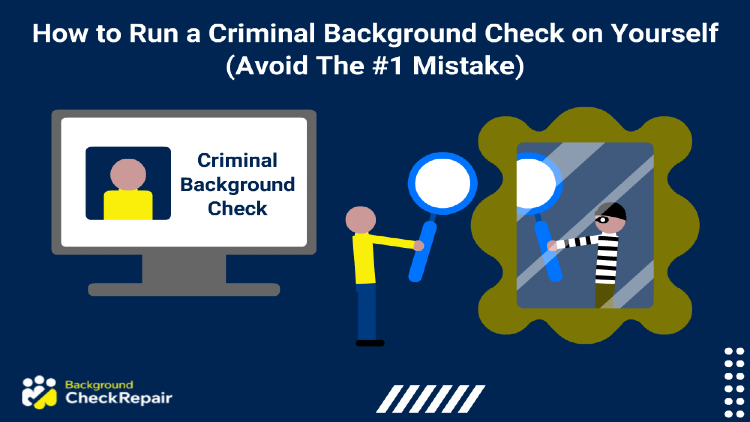
Table of Contents
Knowing how to run a background check on yourself is not only important to see what is on your record, but also to make sure everything is factual and up to date. It is not uncommon to find criminal records that have been filed wrong or even criminal records that aren’t yours at all.
Since almost all criminal history data is manually entered into databases by various government agencies, it’s not unheard of for mistakes and inaccuracies to appear. But, anyone can make sure that doesn’t happen to them by conducting their own background search first, both at the local level and the federal background check level.
This article shows all official methods of performing a criminal records check on yourself.
Avoid the #1 Mistake: Identify the Level of Background Check To Run
Before you run a criminal records check on yourself with the steps shown below, it’s important to know that not all background checks are created equal. The number one mistake people make when checking their own criminal history is relying on an incomplete search, or the wrong kind of background investigation.
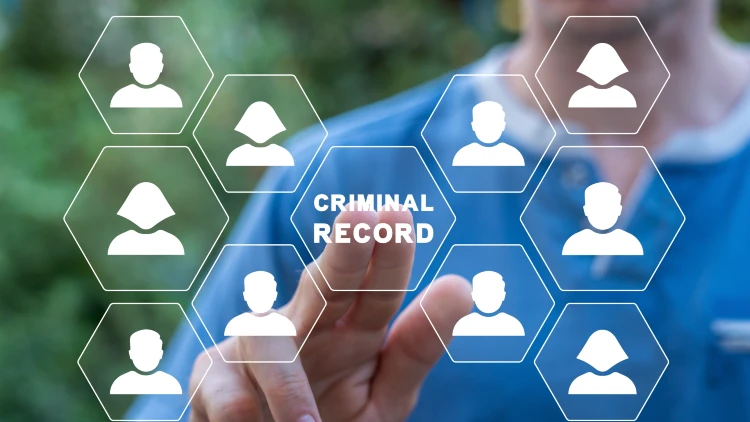
For example, it can be a big mistake for a person to run a criminal background check using only a name-based search (also called a level 1 background check), since an employer may use a more comprehensive check, such as a level 2 background check.
Throughout the United States, level 1 background screenings (like the local searches explained below) are conducted through a name-based or local search, which only screens records for the state where the check is conducted. Level 1 checks will reveal both state and local employment and criminal records, including misdemeanors, felonies, and other infractions. If a level 1 check requires submitting a social security number, it may also verify past employers. However, this type of check will not reveal crimes committed out of the state where the screening was run, as a result, a level 1 check’s scope is limited.1
On the other hand, a level 2 check is more intense than a level 1 check and screens national records using fingerprints. Typically, these checks are run for employment opportunities requiring higher levels of trust, such as working with vulnerable populations or finance because screening criminal records using fingerprint submissions kept by the FBI is one of the most reliable ways to perform a background check.6
However, when learning how to run a criminal background check on yourself, using a detailed process that utilizes the same searches a potential employer or landlord will employ can ensure that the results are exhaustive.
DIY Background Check: How To Find a Local Criminal Record
A local jurisdiction name-based check or level 1 background check reveals criminal history search records from the county or state, including warrants, recent arrests, convictions, and incarceration records.
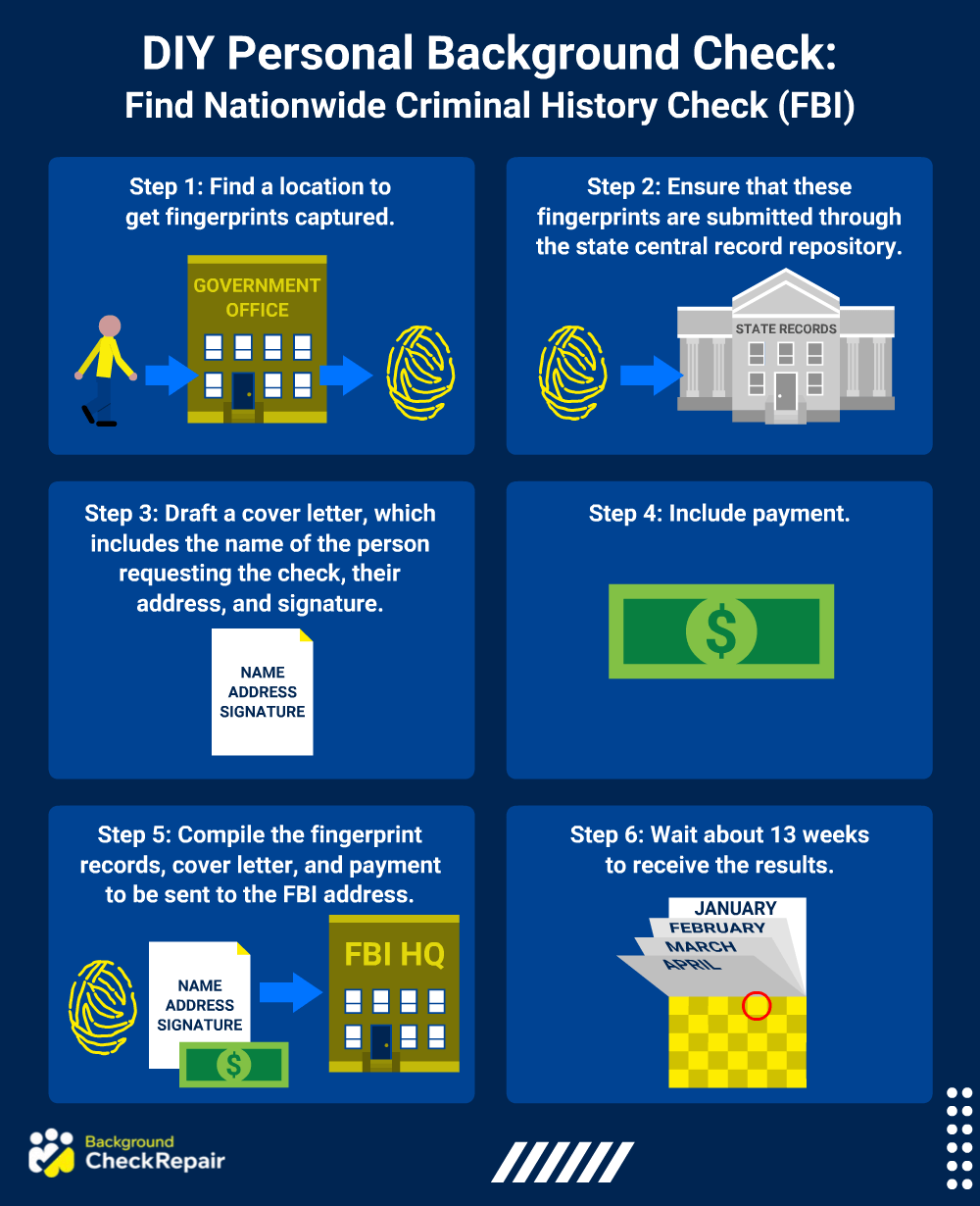
Since the documents on a criminal record are considered public records, anyone can search for this type of criminal history, so it’s very simple to learn how to run a criminal background check on yourself at the local level.
Follow these steps showing ways of obtaining a copy of your criminal history on file:
Step 1. Check Local Court Records (Visit County and State Court Clerks)
Check local court records first, to see if any appearances in court have been archived, as well as what they include. Depending on the state or jurisdiction, accessibility to these records may vary. In some states or counties, records may be available online, while others must be picked up in person or mailed.
Under some circumstances, court records may not always be available to the public, such as juvenile criminal history or those that have been sealed or expunged.
To pick up local court records in person:
- Visit the courthouse in the jurisdiction of residency. For example, for a personal background search, go to the courthouse or county clerk’s office and look for “records requests.”
- Fill out any forms for the specific records being sought, which will include the case number or the name of the party involved in the case.
- Confirm identity, using either a state-issued ID or social security number.
- Possibly pay a small fee, which will vary by locality and state.
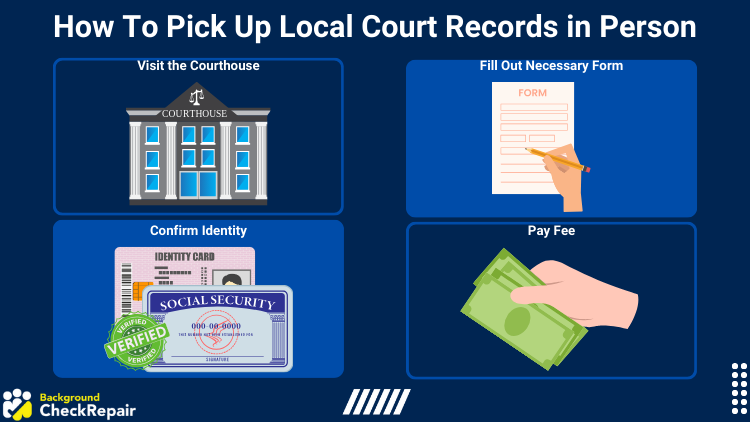
In many states, if the person is a party to the court case, they will have instant access to the records after showing ID. In other states, the form may have to be reviewed, and the documentation will be mailed later upon approval by the court clerk. For example, in the state of Maryland, a person can request court records at the county clerk’s office, in the county where the case was heard. When learning how to run a criminal background check on yourself, official online resources provide a wealth of information.
To get local criminal records from an online database:
- Search the county name (or county name with the words “court clerk”) with the words “criminal records” using any search engine.
- Find the official court clerk website (usually followed by a “.gov” or other official domain).
- Navigate to the website, and search for “criminal records request” or “services.”
- Follow the detailed instructions provided by the online court clerk site.
In Maryland, the online database is known as the Maryland Judiciary Case Search.7 This repository contains, and makes available, public records on criminal charges. Alternatively, if a person is involved (not a third-party searcher), they can access their records online through Maryland Electronic Courts,8 another database that is closed to the general public.
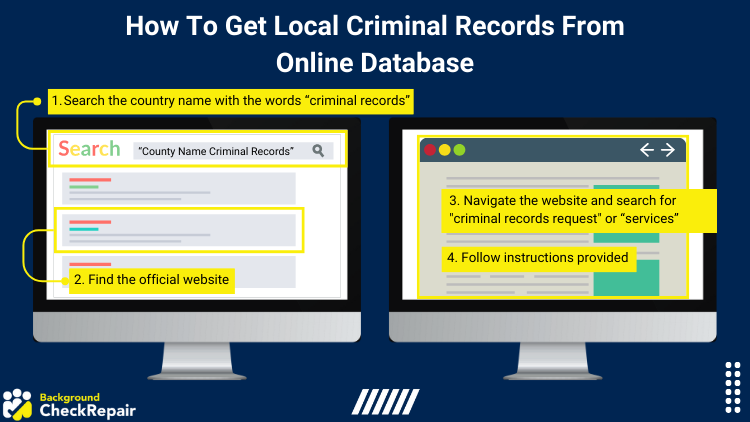
For most states, the process for online criminal record searches and conducting a records check on yourself is generally similar.
To get criminal records from the state courts:
- Simply search the state name with the words “court records” or “justice department.”
- Scroll through the results to find an official link (usually a “.gov” domain.)
- Once at the state website, look for “services” or “background check” links and follow the steps outlined by the website.
Remember, when conducting a “do it yourself” background check, it is always important to research state laws concerning court records and how accessible they are to the general public.
Step 2. Check With Local Law Enforcement
In addition to local courts, criminal records can be searched at the local law enforcement level, including the county sheriff’s office, local police departments, and state police databases.
Often, a person may need to visit the police department in person, to verify their identity and obtain any documents. Alternatively, a person can conduct an internet search to see if their local law enforcement agencies have an online repository with arrest records, RAP sheets, and other information.
To find criminal records from county or local police agencies:
- Search the county name (or county name with the words “sheriff’s office”) using any search engine. (The same can be done for a local police department, such as “Dallas Police Department” for criminal records in Texas)
- Find the official sheriff’s or police department website (usually followed by a “.gov” or other official domain).
- Navigate to the website, and search for “criminal records request” or “background check,” or “services.”
- Follow the detailed instructions provided by the site.
The state’s official repository for criminal records will include all the information from various counties and police department divisions. For example, in South Carolina, a person can search their statewide records using the State Law Enforcement Division’s database,9 which collects criminal records for all jurisdictions.
To conduct this online search, a person will need their full legal name (which is why knowing looking up a person’s middle name is crucial), date of birth, and social security number. To obtain their own criminal records, a person must pay $25 to the state. Alternatively, South Carolina residents can also request their criminal records via mail.
Similarly, in Florida, a person can search for their criminal records using the Florida Department of Law Enforcement’s Criminal History Search,10 an online database. This search costs $24 and requires an individual to enter the same information as that in South Carolina.
The process for searching online state law enforcement databases for criminal history is the same as the local level.
DIY Personal Background Check: Find Nationwide Criminal History Check (FBI)
There are several steps involved in requesting an FBI background check,11 arguably the most reliable type of background check report. Even if the check is being requested by the person themselves, it is important to follow each step on the Identity History Summary checklist, so that the results of the check can arrive in a timely manner.
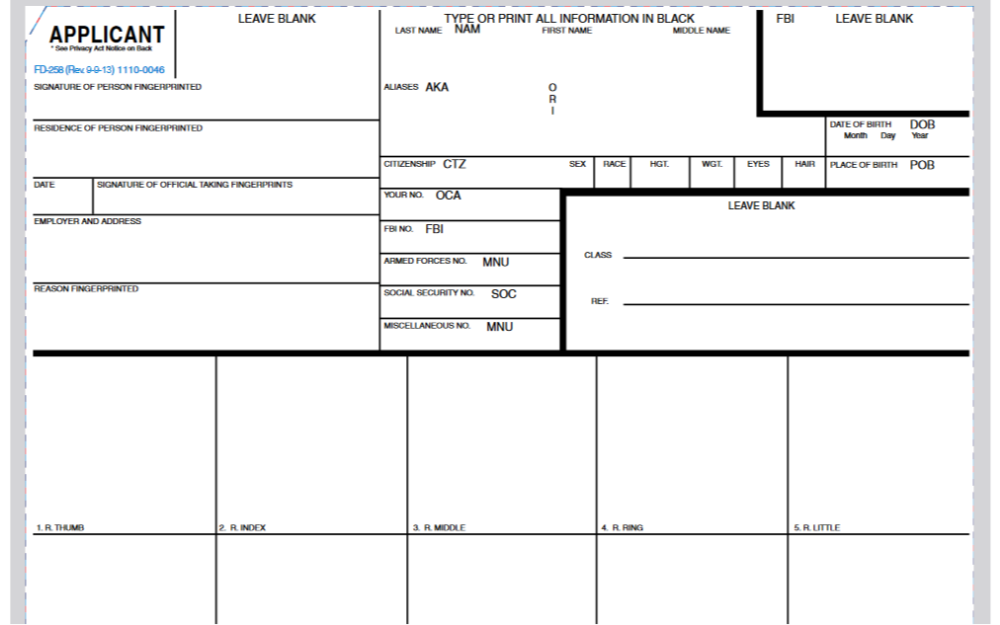
(Image by: FBI16)
Follow these steps for obtaining a federal records check on yourself:
- First, the person requesting the check needs to find a location to get their fingerprints captured. To find a nearby location, conduct an internet search for fingerprinting services in their jurisdiction. Fingerprints can be officially submitted at certified private businesses, government offices, law enforcement offices, or mailed.
- Ensure that these fingerprints are submitted through the state central record repository so that both state and nationwide searches can be run.12 It is also important to scan all 10 fingerprints, as required by the FBI. Note, these fingerprints must be new, and cannot be recorded from a previous request for a background check.
- Draft a cover letter, which includes the name of the person requesting the check, their mailing address, and legal signature.
- Include payment for $18 in processing fees, via check or online.
- Compile the fingerprint records, cover letter, and payment to be sent to the FBI address.
- After the cover letter, fingerprints, and payment are received, it will take about 13 weeks to receive the results. The results of the screening (RAP Sheet) will only be sent to the individual requesting the background check and will be received via mail.
Expedited services are available using digital fingerprinting methods.
Before doing this, it’s important to know the extent of an FBI background investigation.
Run Background Checks on Yourself for What Could Happen: Clear Your Criminal Record First
The most common types of background checks used by employers are level 1 and level 2 background checks. Knowing how these work makes it easy to learn how to run a criminal background check on yourself. However, many industries require specialized background checks, and understanding what these checks will reveal can make it easier for individuals to perform self-background checks first, before a potential employer, to find the information needed to help clear a criminal record for any opportunities that may come up.
Perform an Online Name-Based Search
From time to time, a person should enter their name in an online search engine (using an ‘in-private’ or ‘incognito’ setting) to quickly scan for public reports, social media profiles and images that may be of interest to a potential employer, landlord, or other individual conducting a background check.
Look for things like:
- Potentially offensive or discriminatory posts and pictures
- Negative reports
- Residence reports (if an address is incorrect, etc.)
- Reverse phone number lookups (check for incorrect info)
- Content showing drug use, bullying, or violence
- Controversial posts and opinions related to race, religion, or gender
According to one study, up to 70% of employers screen social media accounts when screening new applicants, so this sort of ‘public background check’ can help ensure the information out there is accurate.2
Criminal Background Checks For Working in the Public Sector
Jobs in the public sector or government require elevated types of background checks, such as a fingerprint background check. Some government jobs may also require a security clearance,13 another type of enhanced background check. This will include an FBI check on the applicant, as well as family members, a spouse, and children. It will also include a credit check and tax lien check.
Criminal Background Checks for Working Around Children
Typically, a fingerprint check is also required to work with children, as well as other vulnerable populations, such as the elderly or disabled. In fact, federal law states that all childcare providers must undergo comprehensive background checks, which include an official fingerprint check. Many states also mandate screening in the state sex offender registry, the state-based child abuse and neglect registry, as well as the state criminal registry.
Criminal Background Checks For Working in the Medical Field
To work in the medical field, various levels of background checks and vetting processes are involved. In particular, those with a criminal background involving drug addiction, drug possession, or drug distribution may be barred from working in healthcare or from nursing duties.
For instance, in Washington DC, certain crimes prohibit individuals from working in the medical field. These crimes include but are not limited to:
- Violent crimes such as assault or manslaughter
- Kidnapping
- Theft
- Fraud
- Rape or sexual assault
- Child abuse
- Drug-related crimes3
Criminal Background Checks For Working With Finances
If someone wants to work in finance, such as at a bank or credit union, they should anticipate a credit background check, in addition to a standard background check. A credit report will include a payment record of on-time and late payments, the amount of debt owed, and the amount of available credit. When learning how to run a criminal background check on yourself, it’s a good idea to also check the credit report. It will also show how many different streams of credit an individual has, for example, how many credit cards they currently have open.4
How Often To Run a Criminal History Check on Yourself
State and federal legislation limit how long certain criminal history can appear on a background check. As a result, it may be useful for someone to conduct a “do it yourself” background check on themselves every few years, as the information revealed in a screening is subject to change.
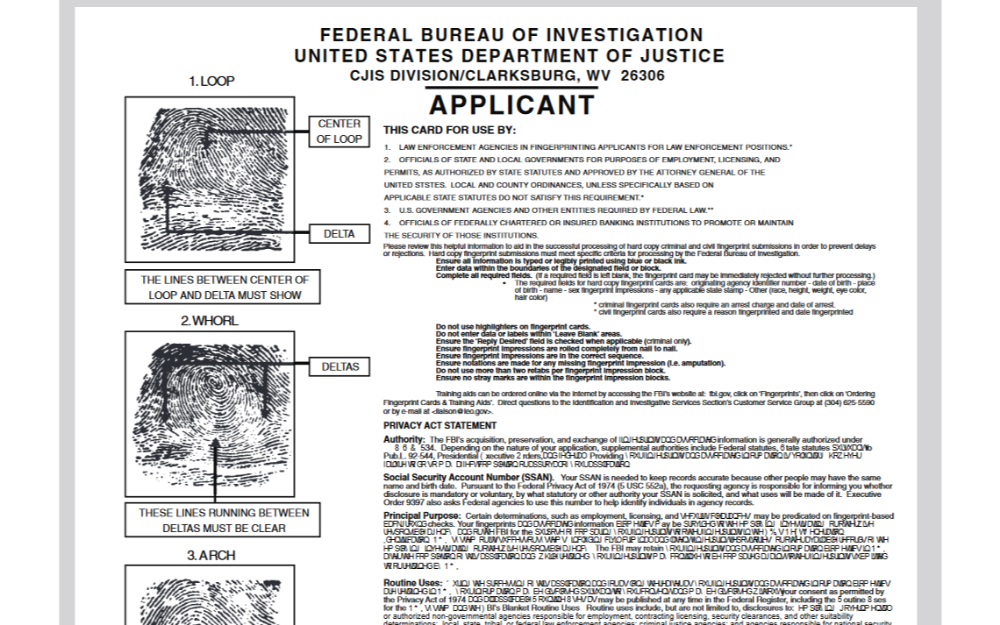
(Image by: FBI16)
For example, the Fair Credit Reporting Act,14 a group of federal regulations, prevents background checks from including certain records that are older than 7 or 10 years old. These limited records include:
- Arrest records older than 7 years (in any state)
- Bankruptcies older than 10 years or collections older than 7 years
- Civil suits older than 7 years
- Civil judgements older than 7 years5
However, many US states have additional regulations, on top of these federal laws. When conducting a “do it yourself” background check, it is essential to learn these state differences in regulations.
For example, in Tennessee, any type of criminal record can be included in a background check, even if it is only an infraction or misdemeanor. Therefore, even if someone was convicted of a misdemeanor 30 years ago, it may still appear on a records check in Tennessee. Even more so, potential employers can use this information to deny individuals employment. Currently, there are now laws in Tennessee to prevent employers from using dated records against job applicants in the hiring process.
If a person has a criminal record that is several decades old, there are some states which they can seek employment in, without risking exposing this record to potential employers during the hiring process. For example, California and New York have laws stating that no criminal records older than seven years can appear on a background check. Therefore, if a person is unsure if something on their record is too old to appear on a background check, they should conduct a DIY screening for their specific state.
In most states, felonies can be included in background checks indefinitely. Heinous crimes, such as murder or sexual abuse of minors, typically appear on background checks indefinitely. Other records, such as educational history, employment history, and licenses and certifications may also appear on background checks indefinitely.
Do’s and Don’t for How To Run a Criminal Background Check History on Yourself
There are some best practices to follow when conducting a criminal background check on yourself.
Do:
- Set aside enough time to conduct a thorough check. When done manually by an individual, conducting a background check can be time-consuming, so make sure to allot some extra.
- Check multiple sources for information, both online and in person. Each source may reveal varying levels of detail.
- Double-check any social media accounts for offensive, inappropriate, or controversial content. Delete any posts that someone would not want a potential employer to see.
- Invest in an FBI fingerprint background check.
- Pay a small fee for a background check company to conduct a consumer report, which may be able to help a person understand what information their potential employer may have access to. Many companies provide some of the most thorough background screenings available and prevent a person from having to do most of the work themselves.
- If denied a job opportunity, always ask a potential employer for the Summary of Rights,15 the report released by the background check company that ran the screening. This report will notify job applicants of what was revealed in the background check and how to contact them, in case there are any errors or outdated information. Applicants should always review this summary after conducting their self-run criminal history, to see if there are any differences.
- Look up what is allowed to be included in a pre-employment background check, depending on the particular state. Be sure to pay attention to federal regulations imposed by national agencies, such as the Federal Trade Commission (FTC) and the Equal Employment Opportunity Commission (EEOC). A person should familiarize themselves with both of these agencies, to understand where to access certain information concerning background checks.
- Conduct a do-it-yourself background check at least every 7 years, to see any changes on a record, due to state or federal limitations on how long convictions can appear on a criminal record.
- Check state and national sex offender registries, using the name, address, and date of birth. This is particularly important for individuals interested in working with children or other vulnerable populations, who may be barred from these types of jobs if they have a certain criminal record.1
Don’t:
- Do not assume that employers will only use a name-based search for pre-employment background checks. According to a survey conducted by the federal agency, the US Equal Employment Opportunity Commission, about 92% of employers request permission to run background checks on their employees. This may vary depending on the industry a person is aiming to work in.
- Do not wait too long to run a personal criminal history screening. According to the Fair Credit Reporting Act (FCRA), a potential employer must request permission to conduct a background check on a job applicant. While a job applicant is legally permitted to not consent to a background check, an employer is also legally permitted to deny them the job position. As a result, they should be aware of their criminal record, and what may appear on a screening, before consenting to a background check. Therefore, they may be able to explain anything controversial that will appear on their screening to the potential employer, so that they may still have a chance at being employed.
- Do not deny a potential employer permission to run a pre-employment background check. While this is the right of every job applicant in the United States, an employer is allowed to end the hiring process based on this.
- Do not limit a search to only current legal names and addresses. It is important to conduct “do it yourself” background checks using all prior addresses from other states, any past legal names, and any aliases that may be used on legal documents or social media sites, to obtain any information that has the potential to appear on a more professional background check.
- Do not assume that dismissed charges or expunged records will not show up on a background check. Sometimes, it takes time for this information to be removed from a record, and depending on the state, it may still be available to certain hiring authorities, such as government offices. It is always best for a person to run a criminal background check on themselves first, so they can verify whether or not dismissed or expunged charges are truly removed from their record.
To prepare for a new job or new position, knowing “how to run a criminal background check on yourself,” is crucial to ensure that the information on the record is correct.
References
1Edge Employment Screening. (2016, January 5). What is the Difference between Level 1 and Level 2 Background Screening? Edge Employment Screening. Retrieved December 22, 2021, from <https://edgeinformation.com/2016/01/what-is-the-difference-between-level-1-and-level-2-background-screening/>
2Schooley, S. (2020, March 12). Background Checks: Can You DIY? Business.com. Retrieved December 22, 2021, from <https://www.business.com/articles/personal-background-check/>
3District of Columbia. (2024). District of Columbia Municipal Regulations. District of Columbia. Retrieved December 22, 2021, from <https://dchealth.dc.gov/sites/default/files/dc/sites/doh/publication/attachments/Health_%20Care_%20Facility_%20Unlicensed_%20Personnel_%20Criminal_%20Background_%20Checks_0.pdf>
4Dayton, D. (2021, August 31). Can You Still Get a Job As a Teller With Derogatory Credit? CHRON. Retrieved December 22, 2021, from <https://work.chron.com/can-still-job-teller-derogatory-credit-3611.html>
5Korolevich, S. (2020, September 21).Background Checks: How Far Back Do They Go? GoodHire. Retrieved December 22, 2021, from <https://www.goodhire.com/resources/articles/how-far-back-do-background-checks-go/>
6Federal Bureau of Investigation. (2024). Identity History Summary Checks (Rap Sheets). FBI. Retrieved April 30, 2024, from <https://www.fbi.gov/services/cjis/identity-history-summary-checks>
7Maryland Judiciary Case Search. (2024). Disclaimer. Maryland Judiciary Case Search. Retrieved April 30, 2024, from <https://casesearch.courts.state.md.us/casesearch/>
8Maryland Judiciary. (2024). E-filing. Maryland Electronic Courts. Retrieved April 30, 2024, from <https://www.mdcourts.gov/mdec/efiling>
9South Carolina Law Enforcement Division. (2020). Terms and Conditions. South Carolina Law Enforcement Division. Retrieved April 30, 2024, from <https://catch.sled.sc.gov/>
10Florida Department of Law Enforcement. (2020). FDLE’s Criminal History Search Overvie. Florida Department of Law Enforcement. Retrieved April 30, 2024, from <https://cchinet.fdle.state.fl.us/search/app/default?2>
11Federal Bureau of Investigation. (2024). How to Request a FBI Criminal History Record. FBI. Retrieved April 30, 2024, from <https://osse.dc.gov/sites/default/files/dc/sites/osse/publication/attachments/Criminal%20History%20Report%20all%20other%20applicants_8.pdf>
12Federal Bureau of Investigation. (2024). National Fingerprint Based Background Checks Steps for Success. FBI. Retrieved April 30, 2024, from <https://www.fbi.gov/how-we-can-help-you/more-fbi-services-and-information/compact-council/national-fingerprint-based-background-checks-steps-for-success>
13Yale Law School. (2024). Before You Apply: Understanding Government Background Checks. Yale Law School. Retrieved April 30, 2024, from <https://law.yale.edu/student-life/career-development/students/career-pathways/public-interest/you-apply-understanding-government-background-checks>
14Federal Trade Commission. (2018, September). Fair Credit Reporting Act. FTC. Retrieved April 30, 2024, from <https://www.ftc.gov/system/files/documents/statutes/fair-credit-reporting-act/545a_fair-credit-reporting-act-0918.pdf>
15Federal Trade Commission. Contact the Federal Trade Commission. FTC. Retrieved April 30, 2024, from <https://www.ftc.gov/about-ftc/contact>
16Federal Bureau of Investigation. (2024). FD 258 Form. FBI. Retrieved April 30, 2024, from <https://www.edo.cjis.gov/artifacts/standard-fingerprint-form-fd-258-1.pdf>
